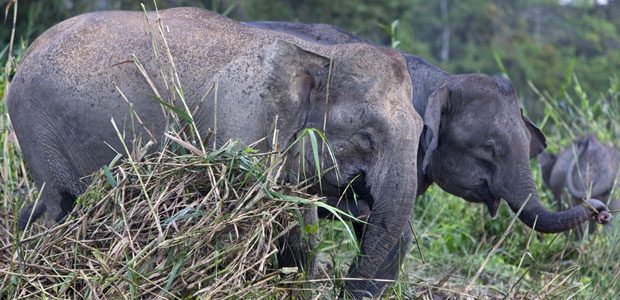Advertisement
Wildlife Wednesday: Borneo Pygmy Elephant
While they haven’t reached the same level of fame as “jumbo shrimp,” at least these grey-skinned, mild-mannered, trunk-wielding pygmy elephants are much, much cuter! HabitatThese petit pachyderms make their homes in Borneo and Sumatra. They spend their days wandering through the South Asian countries’ dense rainforests. Trivia With a height that tops out at about … Continued

While they haven’t reached the same level of fame as “jumbo shrimp,” at least these grey-skinned, mild-mannered, trunk-wielding pygmy elephants are much, much cuter!
Habitat
These petit pachyderms make their homes in Borneo and Sumatra. They spend their days wandering through the South Asian countries’ dense rainforests.
Trivia
- With a height that tops out at about 9.8 ft (3 m), they’re the smallest elephants in Asia, and a good 2 ft (0.6 m) smaller than their savannah-loving cousin, the African elephant.
- There’s no denying it—the resemblance to Dumbo is uncanny. They’re more roly-poly than other species, and their small trunks and adorably round faces make their oversized ears look even more so.
- They didn’t fly to Borneo and Sumatra, so how did they get there? It’s a debated topic, but one theory states that these tiny trunk-slingers descended from a herd of now-extinct Javan elephants brought to the islands several hundred years ago.
- Like other pachyderms, pygmy elephants live in herds that generally consist of mothers, sisters, daughters, and immature males. Bulls, meanwhile, are normally solitary.
Why are they threatened?
Unfortunately, the past 20 years haven’t been kind to pygmy elephants. The past two decades have seen massive swaths of their natural ranges replaced with agricultural land for the production of palm oil and other crops. As a result, human-elephant conflicts are on the rise and feeding and breeding grounds are shrinking.
Other concerns include habitat fragmentation due to logging, and hunting the animals for their tusks.
However, organizations and governments are working hard to conserve the rainforests—and the elephants that rely on them. WWF Indonesia is working with South Asian forestry agencies and governments to create a task force that mitigates human-elephant conflicts, and Norway has agreed to give Indonesia over $1 billion to fight deforestation.





